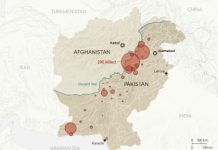The much-anticipated Turkmenistan-Afghanistan-Pakistan-India (TAPI) gas pipeline project, once hailed as a beacon of regional energy cooperation and economic integration, finds itself in a state of indefinite limbo. Recent escalations in tensions between Pakistan and India have dealt a serious blow to the feasibility of this already challenged venture, further compounding the difficulties posed by the ongoing instability in Afghanistan.
TAPI, designed to transport natural gas from Turkmenistan’s Galkynysh gas field to India through Afghanistan and Pakistan, was envisioned as a win-win proposition for all parties. For energy-starved South Asian nations, particularly Pakistan and India, the pipeline promised a steady and reliable source of natural gas to fuel economic growth. For Afghanistan, it offered a potential economic lifeline through transit fees and job creation. However, regional geopolitics have once again overshadowed economic logic.
The recent military flare-up between Pakistan and India has exacerbated an already strained relationship. In the current environment of mutual mistrust and hostility, any collaborative economic initiative involving both countries is unlikely to progress. Pakistan’s security and strategic concerns regarding India’s involvement in the TAPI project are understandable, especially when national interests are at stake. As long as India remains part of the project framework, Islamabad is unlikely to proceed with full commitment.
Moreover, the deteriorating security situation in Afghanistan poses an even more critical threat to the project. Despite initial optimism following the Taliban’s return to power, the country continues to struggle with internal instability, terrorism, and lack of international recognition. These conditions render the safe construction and operation of a cross-country pipeline virtually impossible. No serious investor or stakeholder can be expected to take risks in a region fraught with such uncertainty.
Adding to the complexity is Turkmenistan’s insistence on keeping India within the project to ensure maximum commercial viability. While the economic rationale is clear—India offers the largest potential market among TAPI participants—this insistence appears to be delaying progress. In light of the changing geopolitical landscape, Turkmenistan may need to reassess its approach. Prioritizing a phased implementation—focusing first on Pakistan and Afghanistan—could be a more practical path forward.
While the TAPI gas pipeline remains a potentially transformative project, its success hinges on improved regional security and pragmatic diplomacy. Unless tensions between Pakistan and India ease, and Afghanistan stabilizes, TAPI is unlikely to move beyond paper. It is time for stakeholders to re-evaluate their strategies and seek phased, flexible alternatives that reflect ground realities.

















